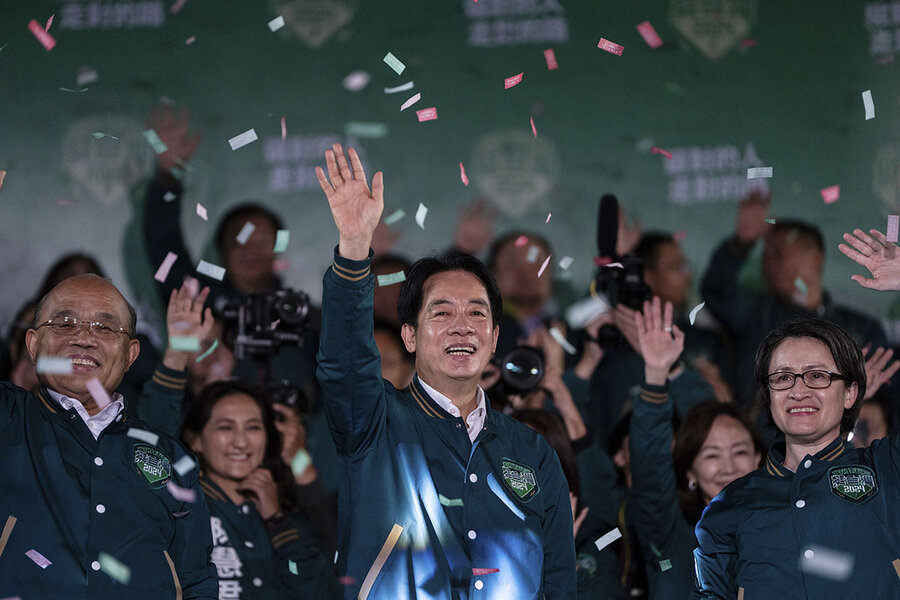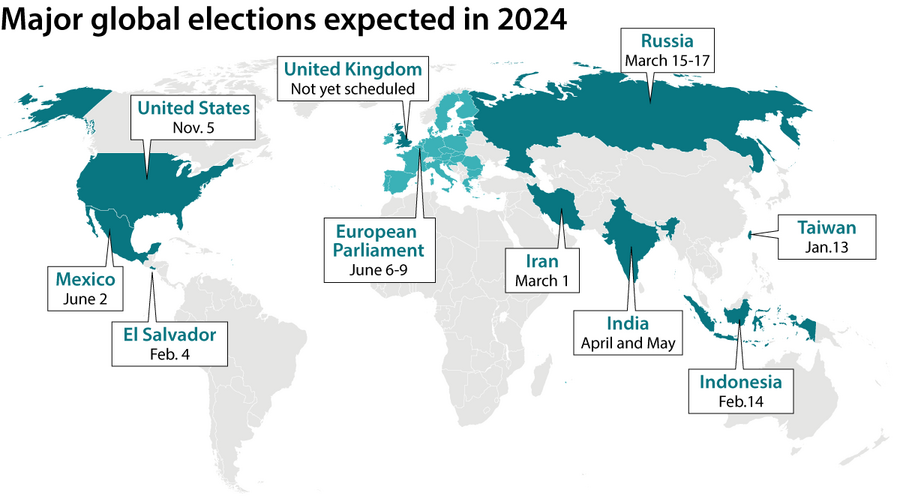Shunned by China, elected by Taiwan: What will Lai face in office?
Loading...
Unswayed by China’s warnings about war, Taiwan’s voters on Saturday again awarded the presidency to the political party – shunned by Beijing – that considers the self-governing island of 23 million people to be de facto independent.
By giving the ruling Democratic Progressive Party (DPP) an unprecedented third consecutive presidential win with the election of Lai Ching-te, voters signaled confidence that Dr. Lai can navigate Taiwan’s delicate relationship with China and maintain the peaceful, if uneasy, status quo.
“Taiwan has achieved a victory for the community of democracies,” Dr. Lai said in a speech on Saturday night, flanked by his running mate for vice president, former U.S. envoy Hsiao Bi-khim. “The Taiwanese people have successfully resisted efforts from external forces to influence this election.”
Why We Wrote This
Taiwan’s voters have spoken, picking Lai Ching-te for president and giving his pro-sovereignty Democratic Progressive Party an unprecedented win. But the DPP’s loss of parliament may curb any bold moves – and provide some comfort to Beijing.
Dr. Lai, a former doctor who is currently serving as Taiwan’s vice president, won 40% of the vote. China’s preferred candidate, Hou Yu-ih of the Kuomintang (KMT) or Nationalist Party, came in second with 33.5%, and last was Ko Wen-je of the Taiwan People’s Party (TPP) with 26.5%.
The election marks a setback for China’s campaign to pressure Taiwan’s voters – through military maneuvers, misinformation, and economic coercion – to choose a president who endorses the concept of “one China,” as does the KMT. China claims Taiwan as its territory and says unification is inevitable, by force if necessary.
Experts say China is likely to react with punitive measures to underscore its displeasure with both the DPP, which it has called “despicable,” and Dr. Lai, a veteran DPP politician whom Beijing has labeled a separatist and traitor.
Beijing will “do something to indicate their hard line against the DPP in a Lai administration,” says Kharis Templeman, a research fellow at the Hoover Institution at Stanford University, where he serves as program manager of the Project on Taiwan in the Indo-Pacific. “I don’t think there will be a honeymoon period for Lai.”
But while the election could well lead to ongoing frictions between China, Taiwan, and Taipei’s strongest ally – the United States – the message sent by Taiwan’s voters could also have more nuanced impacts, as Beijing, Taipei, and Washington each adjust to the outcome.
“Beijing has learned from past mistakes” in its efforts to influence Taiwan, says Dr. Templeman, who was in Taipei observing the elections.
Dr. Lai’s agenda
For Dr. Lai and the DPP, the election win was tempered by the party’s loss of the majority in Taiwan’s Legislative Yuan, or parliament. No party now holds an absolute majority in the 113-member body. The DPP won 51 seats, a loss of 10 from the last election in 2020. The KMT won 52 seats and the TPP eight, both gains.
In terms of raw votes, Dr. Lai also received less than incumbent President Tsai Ing-wen, who won in a landslide in 2020.
“We did not work hard enough,” Dr. Lai acknowledged in his speech. He pledged to incorporate policies of his opponents and draw talent from different political parties into his administration.
The upshot is that Dr. Lai is likely to stay the course established by President Tsai, but will be limited in making bold new initiatives, experts say. “He ran on a promise to continue Tsai Ing-wen’s policies, domestically and internationally, so he has a fairly strong mandate to not do anything radically new,” says Nathan Batto, research fellow at the Election Study Center, National Chengchi University in Taiwan.
A key issue is how Dr. Lai will stabilize Taiwan-China relations. On Saturday, he pledged to pursue exchanges, dialogue, and cooperation with China “under the principles of dignity and parity.”
China’s subdued reaction
For its part, Beijing will be watching closely what Dr. Lai says in his inauguration speech in May.
So far, China’s reaction to the election has been relatively muted. Its official statements suggest that Beijing may take some consolation from the DPP’s mixed performance.
“The results of the two elections in Taiwan this time show that the Democratic Progressive Party cannot represent the mainstream public opinion on the island,” said Chen Binhua, spokesperson for the Taiwan Affairs Office of the State Council, China’s Cabinet, in a statement released Saturday.
On Sunday, China’s Foreign Minister Wang Yi called the pursuit of Taiwan independence a “dead-end” road and said that “China will eventually achieve complete reunification.”
Indeed, China seemed to moderate its pressure tactics during Taiwan’s election, experts say. “China ... didn’t shoot missiles at Taiwan” or warn voters “in a scary way,” says Dr. Batto. “So maybe they’ll take away the lesson that high pressure is counterproductive and low pressure actually works better.”
Less is more?
In part, Taiwan’s public has gotten used to China’s coercion, reducing its impact, says Chong Ja Ian, associate professor of political science at the National University of Singapore. As a result, Beijing’s approach “has been more calibrated,” says Dr. Chong.
Zheng Yongnian, director of the Institute for International Affairs at the Chinese University of Hong Kong, suggested that Beijing should avoid economic sanctions and step up softer tactics such as using social media to “change the identity of young people in Taiwan,” as cited Monday in the blog Sinification.
Indeed, Beijing seeks to “sow polarization in Taiwan [and] sow doubt the U.S. would come to Taiwan’s aid,” says Bonnie Glaser, managing director at the Indo-Pacific Program German Marshall Fund of the United States. “They want to instill ... despair ... so people will ultimately conclude that the only bright future for them is one in which they become part of China.”
China, like the U.S., wants to avoid conflict over Taiwan. But Beijing wants to deter Dr. Lai from any action that could threaten its claim to sovereignty over the island, explains Ms. Glaser, co-author of “U.S.-Taiwan Relations: Will China’s Challenge Lead to a Crisis?”
Washington’s reaction to the election was also tempered, with President Joe Biden underscoring that the U.S. does “not support independence” for Taiwan.
Following Chinese leader Xi Jinping’s meeting with Mr. Biden in San Francisco in November, both sides want to preserve “a fragile stability” between the two superpowers, says Ms. Glaser. “If the Chinese make very dangerous moves on Taiwan, that stability is likely to unravel.”







